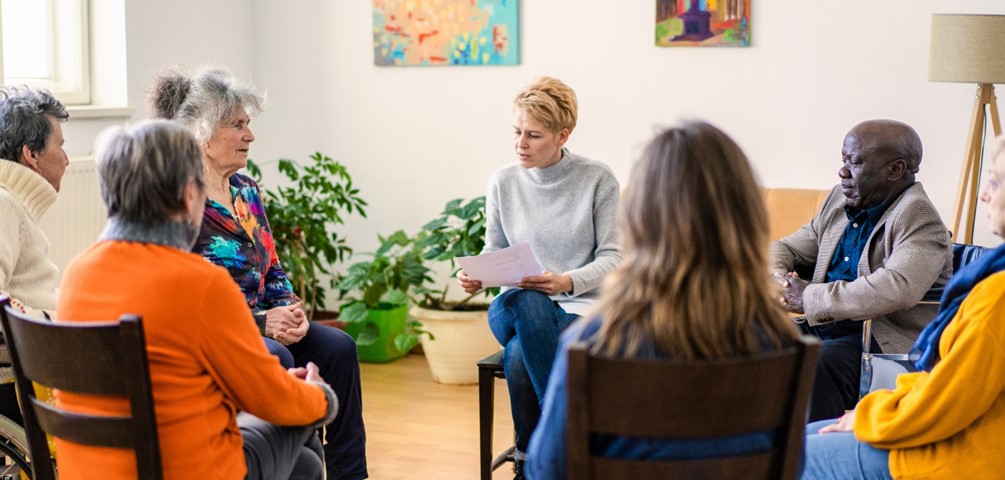
Staff Stories - January 31, 2024
By Liz Pomerleau, Director of Clinical Pastoral Education, Goodwin Living
Not everyone is religious, though most of us have spiritual needs at some point in our lives. In the face of heart-shattering grief, a new diagnosis, waiting for surgery, or an unexpected loss, we often long for a comforting hand to hold, a shoulder to lean on – we seek a connection that helps make sense of it all. Such events impact us deeply and touch our very souls.
As we experience these events, we might find ourselves wondering where we can turn for spiritual comfort and support. And you can find that if you reach out to a chaplain.
Chaplains offer spiritual care in secular settings: hospitals, prisons, the military, universities, mental health institutes, corporations and senior living communities. Chaplains meet us amid our pain, fear or confusion, and they try to offer an empathetic presence as we find our way through.
One of the most common questions I receive is this: How does a person become a professional, board-certified chaplain?
First, they need a three-year master’s degree such as divinity school, seminary or rabbinical school, or other equivalent religious training from one’s faith background. Then, they engage in a program that offers a full year of Clinical Pastoral Education (CPE), which is what I now teach. The master’s degree is traditional academic preparation, and CPE is learning from and with real people in real life. It is fascinating work.
Most of my students come to spiritual care as a second or even third career. They are mature adults with interesting histories. Many have enjoyed previous careers as doctors, lawyers, nurses, teachers, government officials, artists and engineers.
Many students who choose the Goodwin Living CPE program have chosen to interrupt their lives in pursuit of training in spiritual care. They want to devote themselves to easing the suffering of others, and in doing so, they must look at their own suffering.
To be with people who are in pain, we must be willing to go into our own stories, to sit with our own pain, and to find our way through our own suffering. By going through the process ourselves, we cultivate the ability to hold others without trying to fix them, and instead come to develop the faith that they will find their way through darkness and towards life. We learn that presence and connection alone can be miraculously healing.
Part of the job of chaplains is to educate people about what chaplaincy is. Professional chaplaincy is inter-faith; although we are each rooted in our individual faith traditions, we do not represent any one faith.
We respond to the beliefs, values and meanings of the person we are with. We do not teach you what you should believe about God or faith. We ask what you actually do think about God or religion, faith or doubt, fear or hope. Together, we explore a rich emotional and spiritual world that exists beyond dogma and penetrates our most profound lived experiences.
To be clear, chaplaincy is spiritual care in secular settings offered to people of all different religious and faith backgrounds, including those with none.
One of the most rewarding places I’ve worked as a chaplain is in senior living communities. These individuals are fun and funny and don’t care about impressing or insulting me. They have lived too long to care what I think about them and are therefore delightfully honest. They are willing to dig into the truth of their faith and doubts, joys and fears, pride and regrets, questions and opinions, lives and deaths. They do not generally feel obligated to say the “right” thing, which makes for wonderfully refreshing conversation.
There can also be a good amount of suffering in aging. Older adults are marginalized in American culture, which is infatuated with youth, strength and beauty. The price of living a long life is that one is often predeceased by beloved friends and family. Loneliness is common. Then there are the million aches, pains and physical maladies that come with aging bodies. Yet there is also a precious, raw appreciation for life. Vibrant gratitude for each moment of sunshine, friendship, ice cream or blooming flowers.
The Goodwin Living communities where I work, and other, similar senior living communities offer ideal settings to train students in ministry because we learn so much from and with older adults. They make communities spiritually rich with so much to share. We need to invest in more CPE programs in senior living communities. Chaplain students have much to offer and to receive from relationships with older adults.
The Goodwin Living CPE program is one of just nine certified by the Association of Clinical Pastoral Education in senior living communities nationwide. That is not nearly enough given the wave of Baby Boomers who now find themselves aging and in need of care, including spiritual care. I’ve learned how to age better, how to befriend others better and how to live better after being welcomed into and gratefully serving this community of elders.
_______________________
Liz Pomerleau became the Director of Clinical Pastoral Education at Goodwin Living in 2019. She is the grateful mother of two small children, and finds her roots in family and community. Liz is a Board Certified Chaplain through the Association of Professional Chaplains and a Certified Educator with the Association of Clinical Pastoral Education. She is a Quaker by faith tradition. Before becoming an Educator, Liz worked as a professional Hospice Chaplain. In fact, part of her clinical training was through Goodwin Living CPE with Goodwin Hospice. She has devoted her adult life to interfaith spiritual care and supporting the spiritual wellness of older adults. Liz earned a Bachelor of Arts degree in World Religions and Gender Studies from Beloit College in Beloit Wisconsin, and a Master of Divinity from Harvard Divinity School in Cambridge Massachusetts.
